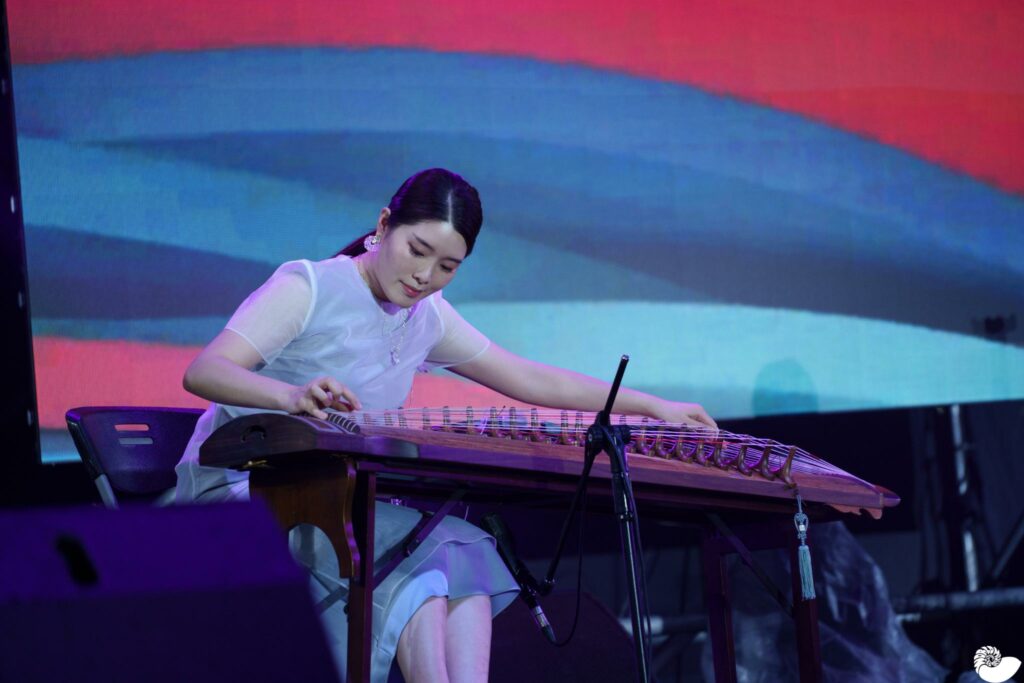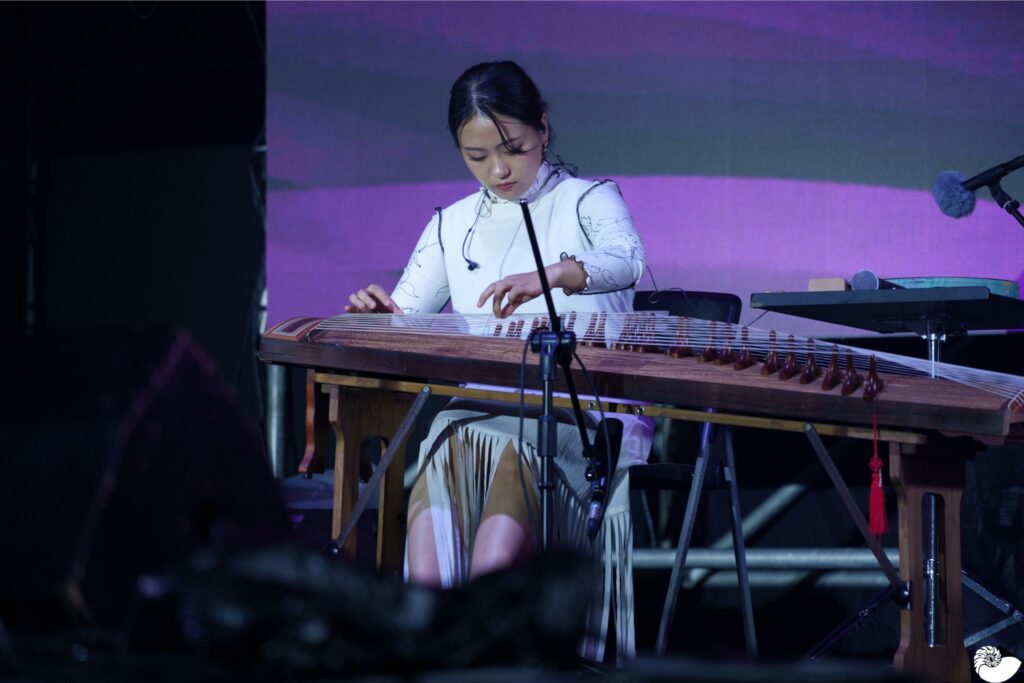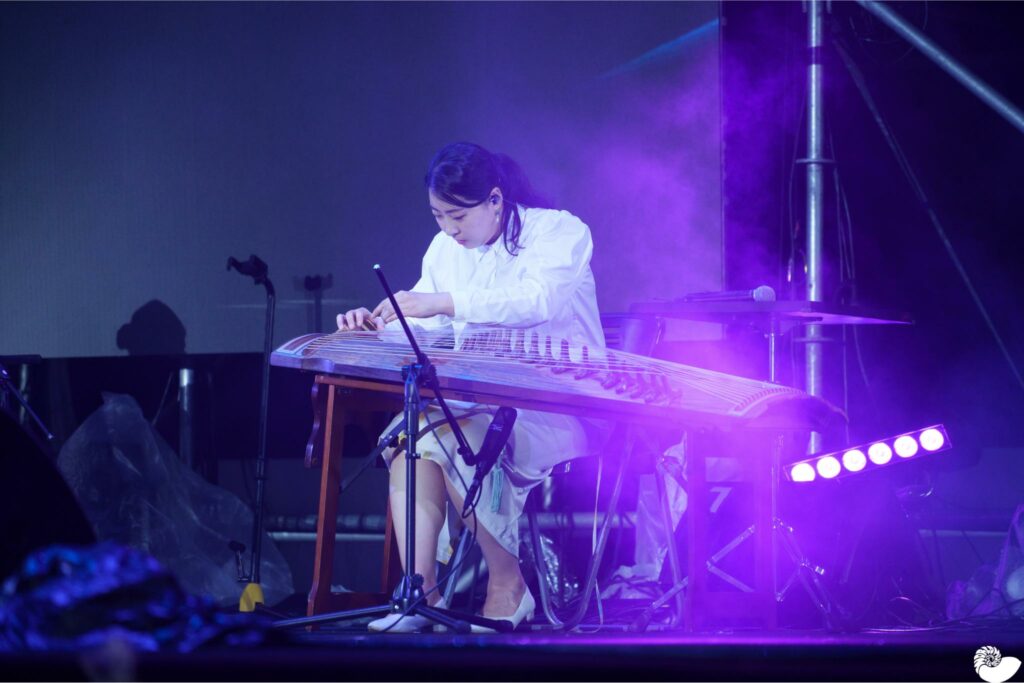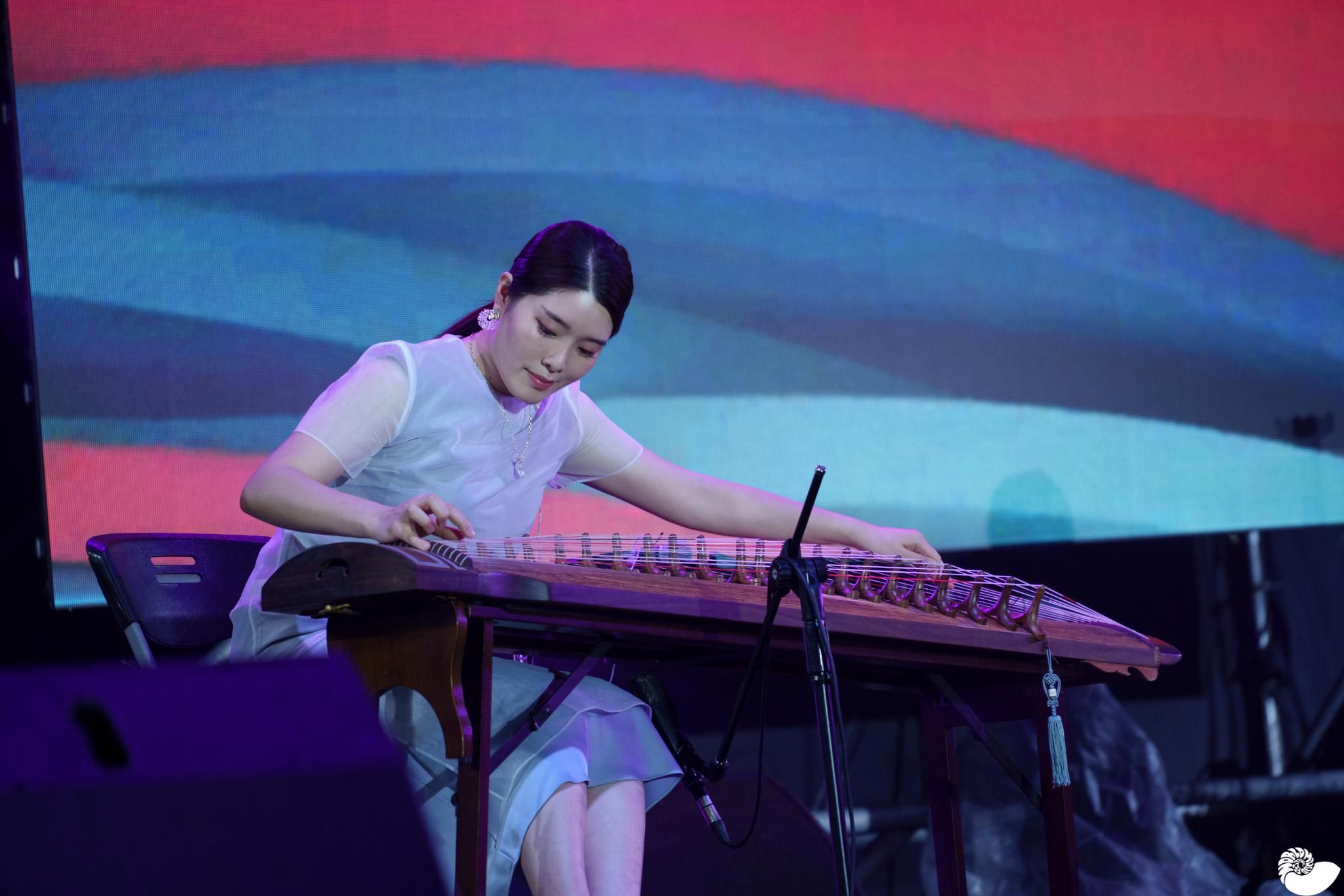As disruption caused by the COVID-19 pandemic lessens, musicians from all over the world have visited Taipei for the World Music Festival @ Taiwan.
Among them was the gayageum trio Hey String, a traditional music group from neighboring South Korea. Their music freely crosses boundaries, adopting both old and contemporary melodies played on the gayageum, a traditional Korean musical instrument.
The performance in October was one of the best at the festival, breaking down boundaries and beautifully harmonized. Even on the rainy outdoor stage, the band's colorful and beautiful energy erupted like the title of their debut song, "Potencia" (potential).
I interviewed Hey String to learn more about their work.
All photos are provided by Wind Music – World Music Festival @ Taiwan 2022

Q: The traditional gayageum has 12 strings, but I can see more strings on your instrument. Did you customize it for Hey String? If so, what kind of musical difference does this customized gayageum have compared to a traditional gayageum?
Park Ji-hyun: Of course, it's not just for Hey String's music. Originally, the traditional gayageum had 12 strings, but about 40 to 50 years ago, 25-string gayageum were made by adding 13 strings. These have been widely used for about 20 years, so it is also becoming a new trend.
What's unique about our music is that we use percussive techniques together rather than using 25-string gayageum. Usually, beating gayageum isn't a common playing style. But we're doing a unique gayageum performance by studying percussive techniques and putting them into music.
Q: I think there was a perception that Korean traditional music was far from us, complicated and boring, and it was just a thing learned in school music classes. However, these days, many new and trendy Korean traditional music bands with their unique character have come out, which makes Korean traditional music more familiar and popular.
As such, ironically, things we already knew, like traditional Korean music, feel rather difficult, while popular and familiar things like young musicians' traditional music seem to us rather unique and attractive. Korean traditional music, the succession of traditions, or the creation of brand-new music?
Oh Ji-hyun: I think there might be a lot of controversy about whether our music is real Korean "traditional" music or not. Of course, nobody says "you're not a Korean traditional musician!" but someone might say, " Do you think that you are a traditional musician just because you use traditional instruments?"
We've all studied traditional music since we were young, and we're still doing it. Still, I think that there may be people who have different views and opinions, and I can accept them. However, I think the root of Hey String is Korean traditional music, and I think the newly created music based on this root has slowly become known and loved by the public.
Q: In Korea, compared to western instruments such as the piano and violin, Korean traditional music used to be very difficult to access to learn. So how did you start gayageum?
Kim Ji-hyo: I think all three of us are different. As far as I know, many gayageum musicians start by learning gayageum as an after-school class in elementary school. In my case, it didn't start with gayageum.
When I was learning samulnori (Korean traditional percussion quartet) at an after-school, I thought, "Huh? I want to major in traditional music." There happened to be a traditional music academy near my house, so I started learning gayageum for the first time there.
Park Ji-hyun: Same with me. I also started at a traditional music academy.
Oh Ji-hyun: I grew up in a rural area and studied in a place where there were few Korean traditional music academies, it was like a wasteland of traditional music. At first, I didn't know anything about traditional music, but I started it at my mother's recommendation.

Q: String trios in western classical music feel familiar, but the ensemble band composed entirely of gayageum seems unique. What was the reason for the formation of a gayageum band, or what's the strength of music comprising just gayageum?
Park Ji-hyun: At first, we met to participate in a creative Korean traditional music competition as a project rather than with the idea of creating a team. We were just people near each other. We were really close to each other in our department at the university.
While working on the project and preparing for the competition, we thought that we fit well together. So, we thought it would be nice if we could team up together. The reason why we decided to do this is because we know each other and gayageum so well. Since we know a lot about each other, it has a synergistic effect, so we can imagine and create a lot more things than when we played gayageum and studied alone. So, we formed a team in earnest.
Q: It's your first overseas concert after COVID. After the performance in England, this time you played in a neighboring country in Asia. How was the performance in Taiwan?
Kim Ji-hyo: It was my first time in Taiwan, and I saw a lot of other performers and musicians in Taiwan through this festival, so it was a great experience. Because of the pandemic, I thought that overseas performances might be delayed.
Of course, there is still COVID-19, but it was great to come to Taiwan and perform like this because overseas performances have resumed faster than I thought. I think this is the biggest festival we've ever participated in. So, I was very nervous when we heard that there might be thousands of people in the audience. But I was really happy the audience responded so well and liked us. And there were so many booths that it was a festival where we could interact with people, so it was a really good experience.
Q: I think you're getting a lot of connections with Taiwan. I know that you also collaborated with the Taiwanese traditional musician Sauljaljui last year. And like now, this year you visited Taiwan for a music festival. Do you have any plans to Collaborate with other artists in Taiwan or hold a concert in Taiwan?
Oh Ji-hyun: We don't have a specific plan yet, but I'd like to keep in touch with the staff and meet Sauljaljui in person again. I'm really curious about other artists and musicians. We're always open .
Q: As you collaborated with Sauljaljui in Taiwan, I wonder if you have any plans to interact with other countries' traditional musicians.
Park Ji-hyun: I think each team member may have different thoughts, but I think it would be good to collaborate with traditional African music, which has a lot of percussion instruments. Gayageum is a musical instrument with a tone and interval, but I think it also has percussive elements because we can express something by bouncing or beating strings. I think that if we collaborate with traditional African music and their various rhythms, it'll be fun.
Q: What does Hey String mean to you?
Kim Ji-hyo: I think Hey String is my musical base. This is because we were able to get away from following the existing music we learned and try to create new styles of music together, so we were able to see ourselves grow together. Above all, the members know my gayageum performance style and music that I want to do the most, so I think Hey String is a musical foundation and base that I can continue to grow, together.
Park Ji-hyun: Hey String is like a "treasure ship" to me.
Kim Ji-hyo: Then, did you find it?
Park Ji-hyun: I'm still looking, but we're all looking for it together. Our members are all on the same boat, starting from the beginning, going through experiences one by one, finding answers, bumping into rocks, and repeating the process together. In this process, sometimes we meet rocks and obstacles, and sometimes there aren't treasures, but nevertheless, it's like a treasure ship because it's fun to repeat our adventure of moving forward again.
Oh Ji-hyun: I just thought of it, but I think Hey String is "Blood Sweat & Tears" (BTS song) to me. I think I grew up a lot by spending almost half of my 20s with Hey String and going through a lot of good things and many things together.

After Park Ji-hyun mentions a "treasure ship (宝船)" named Hey String drops a new anchor on its journey to a "treasure island" (宝岛) called Taiwan or Formosa, she was astonished by the interviewer's remark that Taiwan is indeed called a "treasure island."
But perhaps this was fate, not a coincidence because it is a natural destiny or goal for a treasure ship to reach a treasure island. As such, at the end of the pandemic that has trapped us for the past three years, I hope more of the world's treasure ships will once again be connected with each other to music through treasure island, Taiwan.
At the center of that hope late last year were World Music Festival @ Taiwan and Hey String.





